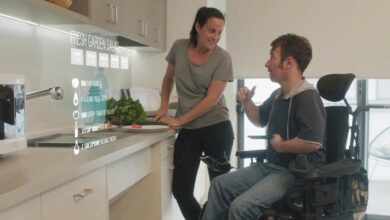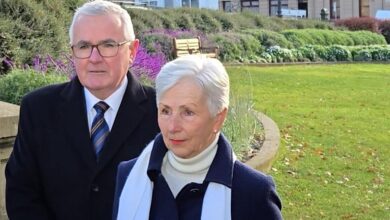Money matters – but how much?

Postgraduate qualifications can lead to more pay and advanced positions for nurses, but many candidates are driven by more personal goals.
Nursing sustains a reputation as one of Australia’s lowest-paid employee categories. Further study can present an array of choices for hands-on specialised and leadership roles that offer increased remuneration. Institutions report that many nurses are, in fact, taking advantage of such opportunities.
The director of academic programs at Queensland University of Technology, Fiona Coyer, reports strong demand for clinical specialist qualifications, including in intensive care and emergency care nursing. “Large numbers of postgraduate nurses are enrolling because in the workplace these … are valued as entry qualifications to the clinical speciality,” Coyer says.
The QUT school of nursing is also getting significant interest in the graduate certificate, and numbers of nurses are then undertaking postgraduate study. Coyer cites a variety of reasons for this, such as nurses upgrading their qualifications when moving to a new specialty area or pursuing a different direction in their career. Clinical leadership, management education and research are amongst study paths some are choosing.
Further, educators suggest that the advanced qualifications are paying off. Associate professor emergency nursing University of Melbourne and Melbourne Health, Marie Gerdtz, says once qualified most nurses who successfully complete a graduate certificate or diploma in emergency nursing will gain paid employment in the specialty. “This is contingent on the quality of the course undertaken and evidence of clinical competency achieved within the specialty,” Gerdtz adds.
Emerging practitioners are finding work in many disciplines. These range from specialisation in critical care, mental health and renal nursing to community or practice nursing. Other career options available to postgraduates include anesthetic nursing and team leadership roles, operational roles and nurse education.
In addition to career advancement, higher education can also point towards simply finding a job, at a time when many nurse graduates are taking longer to find employment, depending on factors such as their specialty and location. Certainly any factor that makes a graduate stand out can be a plus, considering the growth in numbers leaving school. Official estimates in 2011 showed there were more than 45,000 students enrolled in a general nursing course required for initial registration; this was twice the 22,000-plus enrolments from 10 years earlier.
For prospective students requiring financial support for postgraduate studies, options vary by state, with federal government Higher Education Loan Programs (HELP) continuing on offer to those eligible.
As for scholarships, Edith Cowan University in Western Australia reports that a number are claimed each year. And the Canberra-based Australian College of Nursing says it wants more funding for scholarships, especially in remote areas, with more focus on nurses in clinical settings and less on general nursing qualification.
So, scholarship access notwithstanding, there are opportunities for jobs that involve leadership and higher pay. And in the present job climate, there should be scope for nurses to take advantage of them. Depending on their job, many nurses will need to take on further education to make as much as people in other professions. Moreover, some female nurses already face a gender pay gap, with national estimates continuing to reflect remuneration differences between women and men, including in nursing.
Australian Bureau of Statistics estimates for 2012 show full-time nursing and midwifery professionals in non-managerial positions earned $1633.50 a week, on average. The estimates show male midwifery and nursing professionals earned $1759.40 a week on average, compared with $1611.40 for women. In the same study, enrolled nurses fared slightly better, with average earnings in the period at $1155.60 a week, and little difference between the earnings of men and women, the surveyors say. The lower income reflects their relative level of qualifications within the nursing profession, the ABS surveyors add.
So what holds a nurse back from taking on advanced training that will lead to a higher-paying role?
The Queensland Nurses Union conducted a survey in 2011 of members, resulting in almost 1400 responses. Almost half of the nurses indicated they were satisfied with their career progression. However, the surveyors reported that only 15 per cent of respondents were involved in a formal course, whilst 40 per cent were not receiving any support from their employer. The University of Sydney’s Dr Eamon Merrick, a registered nurse and lecturer in acute care at Sydney nursing school, says: “When people have small children or other carer obligations, shift work is sometimes easier to manage than regular hours, and casual work may provide opportunities that 9 to 5 roles do not.
“The motivation for undertaking postgraduate study by registered nurses is seldom financial reward,” Merrick continues. “The registered nurses I have worked and studied with are motivated to undertake further study by the [positive] impact they can see themselves making in the lives of patients and their families.”
Merrick says [his students] regard nursing as “a career that rewards those who challenge themselves to make a difference in the community. Specialisation comes after graduation, but in most undergraduate degrees, students have the opportunity for specialist clinical placements, be they mental health, critical care or operating theatres.”
He says at Sydney Nursing School one’s choice of course depends on the focus of the degree. Graduate programs for transition to professional practice vary across the country. Some transition programs offer clinical rotations through a range of experiences.
It’s unusual for nurses not to practice in their specialty immediately after gaining the qualification, but sometimes the appeal of these roles can erode over time.
“Some nurses find the challenge of shift work difficult over time, for example, as they become parents, and frequent rotations to night duty can be a barrier,” the University of Melbourne’s Gerdtz explains. “Other nurses find the intensity and crisis-driven nature of the emergency department less appealing over time. This can happen as the advanced skills in resuscitation situations and triage become second nature, and interest in other aspects of nursing care develop.”
The physical demands of working in an often high-paced, resource-poor environment are also difficult over time. “My experience of those nurses who stay in the specialty is that they value the autonomy of nursing work in the emergency department and enjoy the team-based nature of the emergency environment,” Gerdtz added.
Merrick pointed out that many nurses are in transition positions before undertaking further study, but added that whilst nursing at an advanced level “[provides] a flexible career for many people who enjoy the work as a clinical nurse, [some] don’t wish to progress further if it takes them away from direct patient care.”
QUT’s Coyer describes postgraduate education as offering “a world of opportunities, including for travel overseas – all motivations that go beyond the financial. Once a registered nurse gets a qualification, a taste for the work often develops and they look further into postgraduate opportunities. Many undergraduate entrants are mature age and looking for a sea change.”
Regardless of motivations, it is unlikely that nurses take on graduate work lightly. University of Melbourne’s Gerdtz says courses in emergency nursing include appraisal of specialty emergency skills such as patient assessment, advanced life support, primary and secondary survey, or head-to-toe rating, and hemodynamic monitoring.
At Melbourne, a graduate certificate or graduate diploma in emergency nursing is gained after initial four-year courses. Gerdtz says most graduate courses will also require nurses to have at least one to two years of experience working in an acute-care setting before enrolling in a graduate certificate or diploma in emergency nursing.
“Whilst undertaking a graduate certificate or graduate diploma in emergency nursing,” she says, “students are required to be employed a minimum of six shifts a fortnight [in equivalent full-time hours] over two semesters in an emergency department where clinical support is provided by the employer.”
She says clinical support includes formal feedback and clinical skills development across two semesters.
Under national guidelines, nurses and midwives are already required to complete 20 hours of study updates each year.
The ANMF, with its more than 233,000 members, plays a key part in this. The federation offers continuous professional education modules on a number of courses that are available online, including ethics in nursing, midwifery and mental health.
In what appeared as an unsaid plea to Australian nurses to engage more in professional development, the peak health employee body, Health Workforce Australia (HWA), in its Health Workforce 2025 – Doctors Nurses and Midwives report, showed that Australia’s present health workforce is highly dependent on immigration for nurses.
The report, published in March of last year, included mental health amongst the disciplines at particular risk of shortages. It demonstrated that undersupply exists generally in RNs, including in specialised disciplines, stating that high demand and under-supply are continuing in acute care nursing, critical care nursing and emergency nursing.
Against this background, and in the climate of increasing demand for health services nationally, Victoria University is collaborating in secondary school-based schemes within the state. Several major hospitals reportedly have endorsement roles.
Email: [email protected]





